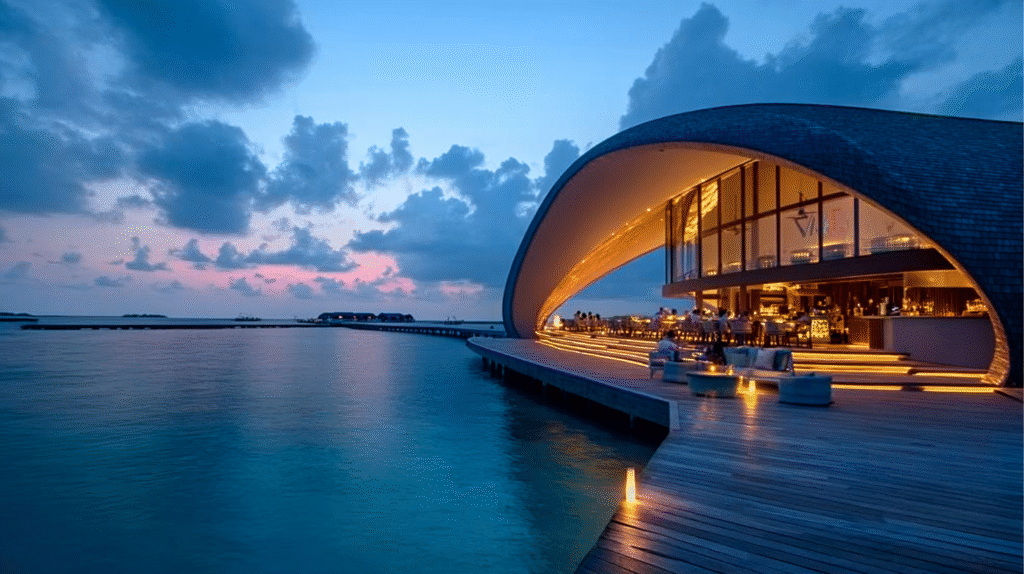TL;DR
Luxury stays aren’t remembered by averages. They’re remembered by a peak and an ending.
-
The peak can be spectacle (a Maldivian sunset bar), authenticity (dawn meditation at Amanjiwo), or a small human gesture.
-
The ending stretches beyond checkout — it’s the whole day of departure: the farewell breakfast, luggage handling, the airport transfer. If this chapter stumbles, it erases everything before it.
-
Negative peaks can dominate memory, but fast, generous recovery can turn them into stories of loyalty.
-
Culture matters: Japan codes farewell as reverence, the Middle East as generosity, Europe as understatement. Copy-paste rituals fail.
-
Economics of memory: a $5 farewell gift can secure repeat visits worth thousands. A 40-minute checkout queue can undo years of brand equity.
Bottom line: Guests pay for days but remember minutes. If the ending fails, the infinity pool was just water.
A couple checks out of a five-star resort in the Caribbean. They’ve slept in a villa bigger than their apartment at home, swum in an infinity pool that seemed to bleed into the ocean, eaten lobster under lanterns. Yet when they talk about the trip weeks later, what surfaces first is the forty-minute line at checkout. The printer broke, the bill was wrong, the staff looked harried. All the glamour collapses into that last memory: waiting under fluorescent light, wallets open.
Why does this happen? Because memory is unfair. Psychologists call it the peak–end rule: we don’t remember the average of an experience, we remember its highest point and how it ended. Neuroscience backs it – the brain encodes emotional highs and closure with special weight, while the rest fades into blur.
In the lab, the “end” is often compressed into the last ten minutes. In luxury resorts, it stretches. The farewell breakfast, the way luggage is handled, the shuttle to the airport – the whole day of departure becomes the closing chapter. If that chapter is clumsy or transactional, it can eclipse even the most dazzling moments. If it is calm and deliberate, it reframes the entire stay as worth it.
And here lies the paradox. Guests pay for days, but they remember minutes. Luxury is not judged by consistency, but by compression.
Designing the peaks
In luxury, peaks aren’t accidents. They’re staged. The danger is that staging can slip into cliché.
Take the floating breakfast in Bali. Once novel, it’s now a conveyor belt of trays wobbling in chlorinated pools, eggs cooling in the sun while couples queue for the same photo. What was meant as theatre has become parody. Luxury peaks fail when they look mass-produced.
The successes feel inevitable rather than manufactured. At the St. Regis Maldives, the Whale Bar cantilevers over the sea, designed for one shot: the sun dropping into the horizon behind its dramatic curve. Guests line up for the photo, and the resort doesn’t hide that fact – it leans into the spectacle. For status-driven travellers, that image is the trip.
For the seasoned traveller, the memorable peak is often quieter. At Amanjiwo in Java, a monk leads a dawn meditation with Borobudur emerging from morning mist. No fanfare, no hashtags – just cultural intimacy layered with awe. These guests don’t want the stage set for Instagram. They want memory to root in meaning.
Some operators now design for both. Soneva Fushi offers “sandbank dinners” – photogenic by design, but also framed as barefoot rituals of sustainability, with dishes cooked over fire under unbroken stars. Guests leave with both the image and the story.
The neuroscience is simple: high emotion floods the brain with dopamine and norepinephrine, marking the event as important. Awe, intimacy, surprise – these are memory accelerants. The problem is not that luxury brands don’t know how to stage them, but that too often they chase spectacle alone. A peak without authenticity is quickly forgotten.
And not every peak needs scale. Sometimes it’s a single staff gesture – a housekeeper who notices a child’s fascination with birds and leaves a field guide in the room. A chef who sends out an unlisted dish with the words, “I thought you might like this.” In the hierarchy of memory, these moments rise higher than marble lobbies.
Designing the endings
If peaks are fireworks, endings are the quiet coda that decides how the music is remembered. In psychology, the end is reduced to the last ten minutes. In luxury, it stretches into the day of departure – the breakfast, the luggage, the transfer, the last words exchanged in the lobby. This is the chapter that fixes how the whole stay is filed away.
The best operators choreograph this with intent. Aman farewells are legendary: staff lined up in silence, a hand over the heart, a token gift slipped into the hand. Oberoi in India layers cultural resonance – a garland of marigolds, a blessing whispered at the door. Four Seasons makes friction disappear: luggage that vanishes from the room and reappears at the airport, as if logistics had been erased. On the Belmond Orient-Express, departure is ceremonial, not transactional.
Contrast that with the failures. A luxury hotel in New York once left guests standing in a forty-minute checkout line under strip-lighting, waiting for a broken printer. U.S. resorts notorious for “resort fees” slip them onto the bill at the last moment – ending the stay with the feeling of being gamed. Even small lapses – a bag mishandled, a curt goodbye, housekeeping knocking too early – echo more loudly on departure day than any triumph mid-stay.
The psychology is unforgiving: the hippocampus privileges closure. If the end is stressful, the stay is remembered as stressful. If the end is serene, the whole arc of the journey is elevated. Economically, the leverage is enormous. A final breakfast that lingers in memory may cost five dollars. A forty-minute queue may cost a lifetime of repeat visits.
Designing endings well requires treating them as a product in their own right. Bills delivered discreetly the night before, or made viewable in-room, so the farewell is ritual not dispute. Checkout aligned with flight times, not rigid hotel schedules. Departure lounges for long-haul travellers. Farewell tokens that feel local, not generic. The last day is not an afterthought – it is the investment that secures the memory economy.
Negative peaks and recovery
Not every peak is positive. A delayed transfer car, a broken air-conditioning unit, a missing bag – these are negative peaks, and left unresolved they eclipse everything else. The couple who spent three nights in a villa with panoramic views will talk less about the sunsets than about the hour they spent in the lobby waiting for someone to fix the air-con.
Yet memory can be rewritten if the recovery is swift and human. Psychologists call it the service recovery paradox: when a failure is corrected with such speed and generosity that the fix becomes more memorable than the fault. Ritz-Carlton is famous for operationalising this. Staff are empowered to act immediately – buying a lost child’s toy locally and returning it with a note before bedtime, arranging a new airport transfer in minutes with refreshments offered while waiting. Guests walk away with a story of care, not of failure.
But recovery is fragile. It works only with minor issues caught early. A meal that arrives cold but is replaced with warmth and an apology may become a fond anecdote. A lost bag never found or a resort fee sprung at checkout is not recoverable. Neuroscience offers the reason: the amygdala prioritises strong negatives for storage. Unless an equally strong, positive emotional signal follows quickly, the negative dominates the memory.
Some resorts misjudge timing. A Caribbean property once emailed guests “compensation vouchers” weeks after a disastrous departure. It landed flat – the stay had already been filed in memory as a loss. Luxury doesn’t operate on delay. The fix has to be lived in the moment.
For operators, the lesson is clear: map the likely negative peaks and give staff the tools to neutralise them instantly. A late recovery is no recovery at all.
The cultural lens
Peaks and endings are not universal. They are read through cultural scripts, and when luxury operators ignore that, rituals slide into caricature.
In Japan, farewell is formality itself. At a traditional ryokan, staff kneel or bow deeply at the entrance, remaining in place until the guest is out of sight. The hush of tatami mats, the scent of cedar in the air, the steady bow – the departure is remembered as reverence. To offer instead a Western champagne toast would feel hollow, even disrespectful.
In the Middle East, the cultural script is generosity. Guests may be sent away with baskets of dates, spice blends, or food for the journey. Abundance at the close signals dignity and honour. The parting gift carries the culture of hospitality beyond the property line.
European luxury often prefers understatement. At Le Bristol in Paris or Belmond’s country houses, the farewell may be no more than a handwritten note slipped into a bag, or a tin of house-made biscuits. No fanfare, no garland – just quiet dignity.
In Australasia, the farewell often leans on landscape rather than ritual. Properties like Kauri Cliffs in New Zealand stage the last breakfast with a panoramic view of the Pacific, open to salt wind and silence. The environment, not the staff, delivers the memory.
What matters is congruence. A Balinese resort that borrows a Parisian style farewell risks feeling contrived; equally, a Dubai hotel that offers a minimalist note instead of generosity misses its cultural pitch. Memory is formed not just by what happens, but by whether it feels true to place.
Designing the memory arc: strategic truths
Luxury isn’t judged by consistency. It’s judged by compression. Guests compress days into fragments, and operators who ignore this are leaving money on the table. A marble bathroom is forgotten; a seamless farewell is remembered.
Truth 1: Peaks must be guaranteed, not left to chance.
Every property needs at least one spectacle peak, one authentic peak, and room for personalised peaks. That’s not excess – it’s insurance. The Instagram curator, the seasoned traveller, and the hybrid guest all need something to carry home.
Truth 2: The end is a product.
Treat the departure day as deliberately as the arrival day. The final breakfast, the luggage choreography, the goodbye ritual – these are not support services, they are the closing act of a play. Cut them, and you cut memory itself.
Truth 3: Recovery is only real-time.
Compensating later is compensation for you, not for them. Unless recovery happens before the memory closes, the guest has already filed the stay under failure. Ritz-Carlton empowers its people to act immediately; anything slower is too late.
Truth 4: Culture codes memory.
Peaks and farewells that don’t fit place feel counterfeit. Authenticity beats imitation, every time. Aligning rituals to the cultural register – and to the guest’s expectations of it – creates resonance. Copy-paste destroys it.
Truth 5: The economics of memory beat the economics of marble.
A farewell gift costing five dollars can secure repeat visits worth thousands. A forty-minute queue at checkout can undo millions in brand equity. Hotels track cost per night; guests track cost per memory.
These truths are simple but often ignored because operators plan for averages. Yet in the memory economy, averages are irrelevant. What matters are the peaks and the close.

When guests look back on a luxury stay, they don’t remember the square footage or the number of pillows. They remember fragments: the one moment that rose above the rest, and how the story closed. A dinner under stars. A child’s laughter answered with kindness. The last breakfast, the scent of frangipani as the car door closed.
Psychologists call it the peak–end rule – memory compressed into a high and a close. In resorts, the “end” expands to the whole departure day, and that chapter outweighs all the others. If the close is careless, the bill feels wasted. If it is graceful, everything before it is elevated.
That is the paradox of luxury: guests pay for days, but they remember minutes. They buy space, but carry home fragments. A pool can be spectacular, a suite immaculate – but if the farewell stumbles, all of it dissolves.
Perhaps the real test of luxury is not what you give guests when they arrive, but what still lingers when they leave. If the ending fails, the infinity pool was just water.



